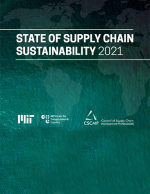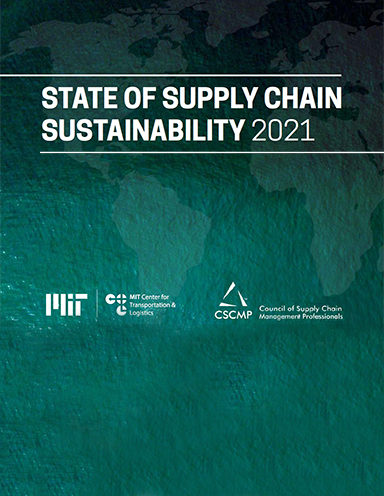State of Supply Chain Sustainability 2021
This report provides a platform to observe how supply chain sustainability changes over time and how supply chain professionals react to these changes, it does not take a stance on whether industries are doing enough, or too much, or on what they should, or shouldn’t do; it is simply a gauge of the direction of supply chain sustainability.
The Report
The State of Supply Chain Sustainability offers a comprehensive examination of supply chain sustainability across industries, geographies, functions, and roles, giving professionals and executives a holistic view of sustainability in the supply chain domain.
The MIT Center for Transportation & Logistics (MIT CTL) and the Council of Supply Chain Management Professionals (CSCMP) published the first annual edition in 2020. The first report established a baseline for subsequent research. Our goal in undertaking this research is to explore how supply chain sustainability is being implemented in global supply chains, to identify broad trends across industries and regions, and illustrate what that means for companies and professionals.
Our research for the inaugural report included a broad survey of industry professionals and in-depth interviews with executives. We found that commitment to supply chain sustainability is a focus for many large (1,000&ndashndash;10,000 employees) and very large (10,000+) companies. We also observed that the tangible investments companies make in supply chain sustainability do not always match their ambitions, especially concerning human rights protection, worker welfare and safety, and fair pay/fair trade. However, companies facing pressure from multiple sources often invest more in these areas of sustainability than those that are not incentivized by pressure from stakeholders.
These early insights provided a snapshot of the state of supply chain sustainability at a macro level. They also left many questions unanswered. Are there underlying patterns in how companies act? How do supply chain sustainability goals, investments, practices, and other measures change over time? What is the impact of the Covid-19 pandemic?
We attempt to answer some of these questions in the current report by refining our analysis and building off the foundation established with last year’s report.
The current report has four dimensions: First, we establish a framework for examining supply chain sustainability in 2020 based on the same measures of pressure, commitment, investment, practices, disclosure, and engagement established last year. Next, we explore the effect of the Covid-19 pandemic on supply chain sustainability and changes between 2019 and 2020 to understand how these measures change over time. We then develop a quantitative typology of firms based on their level of commitment to supply chain sustainability. Finally, we conclude with an outlook on what is to come for supply chain sustainability.
Building off of last year’s report, our second survey included input from twice as many supply chain professionals. We also conducted a new round of executive interviews with a wide range of professionals and companies to explore supply chain sustainability trends more deeply. Finally, we refreshed and extended our analysis of reports, press releases, media articles, and other documents to track activity in the public sphere.
What’s Related




Favorites





